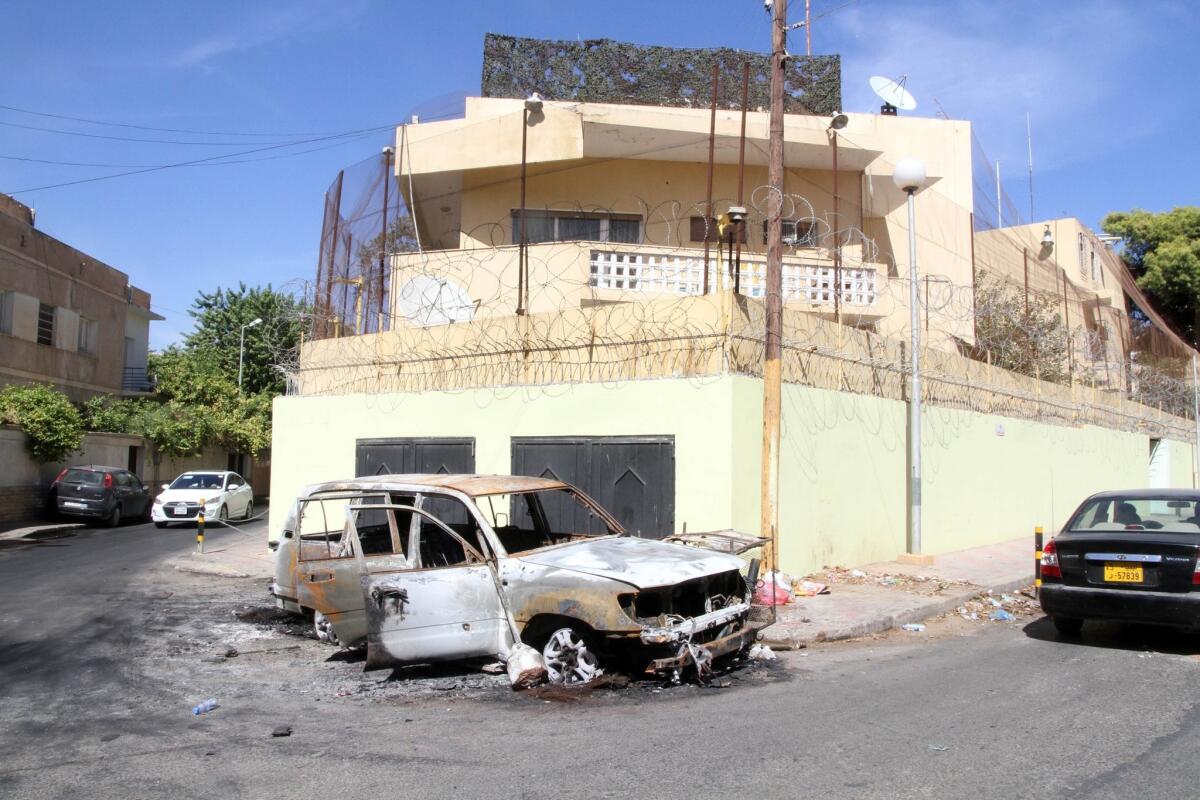Russia evacuates personnel from Libya in wake of embassy attack

- Share via
MOSCOW — Russia evacuated its diplomatic community from Libya on Thursday following an attack on its embassy in Tripoli, and said it was relocating its Libyan mission to Tunisia until conditions were safe.
“On Oct. 3, all the employees of the Russian Embassy and their family members safely crossed the border with Tunisia,” Russian Foreign Ministry spokesman Alexander Lukashevich said in an official statement. “Until the security issues related to the work of our mission in Tripoli are resolved, a group of senior diplomats of the Russian Embassy in Libya will temporarily remain in Tunisia.”
Lukashevich said the others will be flown to Moscow on Friday. He urged Russian citizens to avoid travel to Libya, a volatile country that, for decades, has been a Soviet and Russian ally in the Middle East.
No Russian personnel were hurt when a group of gunmen attacked the embassy Wednesday night with hand grenades and machine guns. An embassy car was burned and some property damaged before embassy guards and Libyan security forces repelled the attack. One of the assailants was killed and four were injured, the Russia-24 television news network reported.
According to Lukashevich, the attack was provoked by the killing of a Libyan air force officer by a Russian citizen, identified as Yekaterina Ustyuzhaninova, who also injured the officer’s mother with a knife. Ustyuzhaninova remains in custody in Libya, he added.
“The incident provoked relatives and friends of the slain Libyan to decide to avenge his death by attacking the Russian diplomatic mission,” Lukashevich said. “The armed attackers succeeded in breaking through into the embassy grounds, but the personnel and their family members hid in the protected premises.”
In a telephone conversation with his Libyan counterpart, Mohammed Abdel-Aziz, Russian Foreign Minister Sergei Lavrov demanded that Libya take action as soon as possible to ensure the safe operation of the embassy, Lukashevich said.
It was not the first violent incident involving diplomatic missions in post-Kaddafi Libya.
The Russian Embassy was attacked in February 2012 by an armed mob protesting Russia’s U.N. Security Council veto of sanctions against the government of neighboring Syria. And U.S. Ambassador Christopher Stevens was killed in an attack by radical Islamists on the U.S. mission in Benghazi on Sept. 11, 2012.
Given that history, it made sense to promptly evacuate Russian Embassy staff and its families, said Leonid Kalashnikov, first deputy chairman of the foreign relations committee in the lower house of Russia’s parliament.
“But as things calm down there, we need to return to Libya and keep our presence there to just have some understanding of where the situation is going,” Kalashnikov said in an interview. “We should all draw key lessons from the deteriorating situation in Libya.”
Only a few Russian citizens remain in Libya, he said — mostly Russian women who married Libyan men.
A senior Middle East expert, Yevgeny Satanovsky, couldn’t resist contrasting the Russian response favorably to that of the United States when it faced “Islamist anarchy” in Libya.
“The United States tried to impose Western democracy in Libya, resulting in never-ending tribal strife and the murder of its ambassador,” Satanovsky, president of the Moscow-based Institute for Middle East Studies, said in an interview. “Russians didn’t wait for such a tragic outcome and moved out before anyone was hurt. The fewer targets remain for radical Islamists in Libya, the better.”
[For the Record, 11:48 a.m. PDT Oct. 3: A previous version of this post quoted a Russian Foreign Ministry spokesman as saying Russian personnel would remain in Tunis, the Tunisian capital. In Russian, Tunis and Tunisia are the same word, but the spokesman meant the country, not the capital.]
ALSO:
In 180-degree reversal, Berlusconi backs Italian premier
El Salvador’s Catholic Church closes key human rights office
Slaying of Greek rapper spurs crackdown on neo-fascist Golden Dawn
More to Read
Sign up for Essential California
The most important California stories and recommendations in your inbox every morning.
You may occasionally receive promotional content from the Los Angeles Times.










